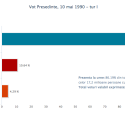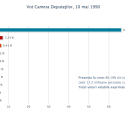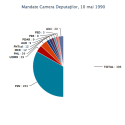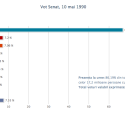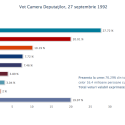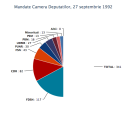IMPORTANT DEVELOPMENTS
- ECONOMY. At the beginning of 2014, the economic outlook for Romania is positive.
- POLITICS. The STS must assume responsibility for the management of the situation in the Apuseni Mountains plain crash.
- CVM. Victor Ponta: the CVM report shows that Romania has made important progress, regardless of the political interpretations.
- GOVERNMENT. An interministerial committee for emergency situation interventions will be set-up at Government level.
–
1. At the beginning of 2014, the economic outlook for Romania is positive
In 2014, Romania will borrow 11% less than in 2013. According to data provided by the BNR, the external debt is falling – the short-term external debt of Romania, registered on November 30, 2013 a level of 19.336 billion euros, down by 7.6% from December 31, 2012. At the same time, Romania ended 2013 with the lowest inflation rate since 1990: 1.55 percent, while the revenues fo the Romanians increased: ‘public sector wages have been replenished, the minimum wage increased by 15%, the pension point increased.
In addition, BCR cheapened the loans in RON, reducing the interest rates on mortgages with a maximum of one percentage point for fixed interes, in the first three years and incomes earned in bank accounts; for the First House Program by about 0.5 points, and also for credits for personal needs by about one percentage point, stressed the spokesmen the bank.
Government officials stressed that the fight against tax evasion in Romania continues to be one of the major objectives of the USL, the major concern being to increase budget revenues. The Finance Ministry has already presented a series of measures prepared by the Government: Companies that do not declare or intentionally misstate tax obligations will be penalized by 20% -50% of the undeclared sum; Those who pay taxes in advance will receive a bonus of 5% -10%; Implementing everywhere cash registers with electronic diary.
The Ponta Government took important decisions to also help companies operating in the IT industry to create new jobs in the country, Government sources said. The state aid scheme in IT provides that firms investing in this field in Romania will benefit from 67 million euros in aid. The same Government officials declared the Government believes that this measure helps keeping Romanian IT specialists in the country. „We want Romania to become a technological hub in South-Eastern Europe”, the USL leaders reiterated.
–
2. The STS must assume responsibility for the management of the situation in the Apuseni Mountains plain crash
Several public figures and political actors have criticized the service, considering it guilty for its inability to quickly and accurately identify the location of those who called at 112, after the accident. The tragedy in the Apuseni Mountains show the great organizational weaknesses of the institution.
On the one hand, the STS should be prepared to intervene in areas that are not covered by private telephone companies. Many USL politicians have stressed in their public interventions the fact that, for years there have been acquisitions, significant sums of money have been spent, so as the STS to expand its coverage also in areas where private companies’ coverage is not available, due to commercial reasons. The years after 2004 were used for investment in wiretapping calls in cities, in order to increase the efficiency of identifying persons in urban areas, not for expanding coverage in remote areas.
They have also pointed out that the service was not actively involved in the search for those in the crash, and failed in the minimal involvement it had. The coordinates were not good and the STS capabilities that exist were not used, because nobody from the institution wanted to be proactive, to get involved, which calls into question the institution’s ability to serve the interests of the citizens.
The STS was the first institution that tried to pass responsibility in other directions, being, actually, the first authority which was supposed to send information to the rescuers, critics of the service’s activity emphasized, critics of the servie emphasized.
They also stressed that resignations at the top management of the institution are required, as well as evaluating how the institution works. All institutions involved had paid in one way or the other for this failure: Romatsa, ISU, MAI; STS did not pay at all, although it should help the citizens. Not talking only legally, but also regarding the purpose of these special structures – which should help the citizen in need, stressed USL leaders.
Prime Minister Victor Ponta, President of PSD, announced on Sunday evening, January 26, 2014, that the document on the convening of the Supreme Defence Council (CSAT) is already at the General Secretariat of the Council, after it has been signed by six members the Government.
‘The document has been sent to the Secretariat of the CSAT. It is signed by CSAT members, belonging to the Government, except for Mr. Cazanciuc, his signature was not necessary. Ministers Chiţoiu, Gabriel Oprea, Corlăţean Andrei Gere and I, Defense Minister Dușa signed. (…) We asked for one thing: in the CSAT, on the agenda, to be a report from the STS, which is not in any way under the authority of the Government, regarding the way they acted in the (aviation) accident on Monday and, more directly, one thing we now know for sure is that the trace-back of the phone call from the survivors was wrong”, the PM explained.
–
3. Victor Ponta: the CVM report shows that Romania has made important progress, regardless of the political interpretations
Prime Minister Victor Ponta, President of PSD, said Wednesday, January 22, 2014, in the beginning of the Government meeting, that the CVM report published by the European Commission shows that Romania has made important progress, regardless of the political interpretations that are given in this document.
‘I’ve seen the CVM report. Regardless of the political interpretations which, obviously, will not miss, I heard what the spokesman of the European Commission said: Romania has made significant and substantial progress. According to the Commission, we are still prepared to enter the Schengen Area, the decision of the Member States will be a political one’, he explained.
In this context, Victor Ponta asked Justice Minister, Robert Cazanciuc, to present „in a balanced way” the text of the report.
„All things which are written in the CVM report please present them and explain them in a balanced and professional way, regardless of how, in the tradition already known, will be politically speculated„, said Victor Ponta.
Romania has made progress in many areas, since the last CVM report, said Wednesday, January 22, 2014, in Brussels, the European Commission spokesman Mark Gray. ‘The balance of key institutions of the judiciary and on integrity remained positive, despite the sometimes difficult circumstances. It continued the adoption of legislative changes needed and long overdue, and the spirit of cooperation between the judicial institutions and the Ministry of Justice contributes to solving problems of management. In this respect, the situation has benefited from the calmer political atmosphere in recent years”, said Mark Gray, who presented the final report regarding the progress of Romania under the Cooperation and Verification Mechanism (CVM).
–
4. An interministerial committee for emergency situation interventions will be set-up at Government level
Prime Minister Victor Ponta, President of PSD, announced Wednesday, January 22, 2014, at the Victoria Palace, the establishment of a ministerial committee to intervene in emergency situations, which will be led by Vice-Prime Minister for Public Order and National Security, Gabriel Oprea.
‘As to the reaction procedure, obviously, there are laws. Regarding civil aviation accidents, there is the Government Decision 741/2008, which sets out very clearly who, how organizes. Unfortunately, this Government decision and other procedures did not work fast enough and well enough, which is why I set up in no time, at Government level, the interministerial Committee for intervention in emergency situations, coordinated by the Vice PM, in which, of course, along with the Vice-Prime Minister on issues of Public Order and National Security, to be directly involved in all cases of the same type the State Secretary Raed Arafat and the head of IGSU, along with representatives of other institutions, whether governmental or non-governmental, so as in the future such situations to be avoided and intervention to be made faster and more efficiently„, said the PM.
Victor Ponta added that he will personally pursue that through this interministerial committee, each institution which did not work at the expected level to undergo changes not only at the individual level, but also ‘to the necessary procedures for situations which, unfortunately, will appear in the future’.



